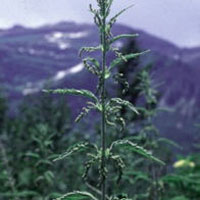Fit and Fast Recipes
Nettle
 © Steven Foster
© Steven FosterHow It Works
There has been a great deal of controversy regarding the identity of nettle’s active constituents. Currently, it is thought that polysaccharides (complex sugars) and lectins are probably the active constituents. Test tube studies suggest the leaf has anti-inflammatory actions. This is thought to be caused by nettle preventing the body from making inflammatory chemicals known as prostaglandins.1 Nettle’s root affects hormones and proteins that carry sex hormones (such as testosterone or estrogen) in the human body. This may explain why it helps benign prostatic hyperplasia (BPH).2 Although less frequently used alone like saw palmetto or pygeum, some limited clinical trials suggest benefit of nettle root extract for men with milder forms of BPH.3
Nettle leaf also contains a variety of flavonoids, which may have antihistamine effects. A preliminary trial reported that capsules made from freeze-dried leaves reduced sneezing and itching in people with hay fever.4 Further studies are needed to confirm this finding, however.
The historical practice of intentionally applying nettle topically with the intent of causing stings to relieve arthritis has been assessed by a questionnaire in modern times.5 The results found intentional nettle stings safe, except for a sometimes painful, sometimes numb rash that lasts 6–24 hours. Additional trials are required to determine if this practice is therapeutically effective.
How to Use It
During the allergy season, two to three 300 mg nettle leaf capsules or tablets or 2–4 ml tincture can be taken three times per day. For BPH, 120 mg of a concentrated root extract in capsules can be taken two times per day.6 Many products for BPH will combine nettle root with saw palmetto or pygeum extracts. Intentional stinging with nettles should only be undertaken after consultation with a physician knowledgeable in botanical medicine.
Copyright © 2026 TraceGains, Inc. All rights reserved.
Learn more about TraceGains, the company.
The information presented by TraceGains is for informational purposes only. It is based on scientific studies (human, animal, or in vitro), clinical experience, or traditional usage as cited in each article. The results reported may not necessarily occur in all individuals. Self-treatment is not recommended for life-threatening conditions that require medical treatment under a doctor's care. For many of the conditions discussed, treatment with prescription or over the counter medication is also available. Consult your doctor, practitioner, and/or pharmacist for any health problem and before using any supplements or before making any changes in prescribed medications. Information expires December 2026.








